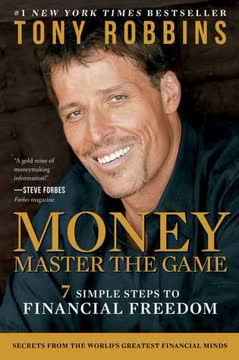Key Takeaways
1. Take control of your finances through intentional budgeting and saving
"If you aim at nothing, you'll hit it every time."
Zero-based budgeting. The key to financial success is creating a written, zero-based budget every month before the month begins. This means allocating every dollar of income to a specific purpose, whether it's expenses, savings, or debt repayment. Use the envelope system for cash expenses to stay on track.
Emergency fund. Start by saving $1,000 as a beginner emergency fund (Baby Step 1). Once you're out of debt, build a full emergency fund of 3-6 months of expenses (Baby Step 3). This protects you from life's unexpected events and prevents you from falling back into debt.
Benefits of budgeting:
- Removes financial stress and guilt
- Helps you achieve your financial goals faster
- Improves communication in relationships
- Gives you control over your money
2. Avoid debt at all costs and pay off existing debts quickly
"The borrower is slave of the lender."
Debt is not a tool. Contrary to popular belief, debt is not a wealth-building tool. It's a product aggressively marketed by banks and credit card companies. Avoid all forms of debt, including car loans, credit cards, and student loans.
Debt snowball method. To get out of debt, use the debt snowball method (Baby Step 2). List your debts from smallest to largest, regardless of interest rate. Pay minimum payments on all debts except the smallest, which you attack with gazelle intensity. Once the smallest debt is paid off, roll that payment into the next smallest debt. This method provides quick wins and motivation to keep going.
Types of debt to avoid:
- Credit cards
- Car loans
- Student loans
- Home equity loans
- Payday loans
3. Build wealth through consistent, long-term investing in mutual funds
"The tortoise wins every time I read the book."
Slow and steady investing. Building wealth is not about get-rich-quick schemes or complicated investment strategies. It's about consistently investing in good growth stock mutual funds over a long period of time. Start investing 15% of your household income for retirement once you're out of debt and have a full emergency fund (Baby Step 4).
Diversification. Spread your investments across four types of mutual funds: growth, growth and income, aggressive growth, and international. This provides diversification and balances risk and return. Avoid single stocks, bonds, and whole life insurance as investment vehicles.
Key investing principles:
- Start early and be consistent
- Invest for the long-term (5+ years)
- Choose mutual funds with a track record of at least 5-10 years
- Use tax-advantaged accounts like 401(k)s and Roth IRAs
4. Protect your assets with proper insurance coverage
"If you don't have health insurance, life insurance, and a will in place, do not go to bed until it is done!"
Essential coverage. Proper insurance is crucial for protecting your assets and transferring risk. Focus on these key areas: homeowner's/renter's, auto, health, disability, long-term care (if over 60), identity theft, and term life insurance.
Avoid unnecessary coverage. Stay away from whole life insurance, credit life insurance, and extended warranties. These products are often overpriced and unnecessary. Instead, self-insure through your emergency fund for smaller risks.
Insurance tips:
- Get term life insurance for 10-12 times your annual income
- Opt for high deductibles to lower premiums
- Review your coverage annually and as your life circumstances change
- Create a "legacy drawer" with all important documents and information
5. Make smart home-buying decisions and pay off your mortgage early
"Location, location, location."
Buy wisely. When buying a home, focus on location and buy in the lower price range of the neighborhood. Get a 15-year fixed-rate mortgage with a payment no more than 25% of your take-home pay. Put at least 20% down to avoid private mortgage insurance (PMI).
Pay it off quickly. Make extra payments on your mortgage to pay it off early (Baby Step 6). This frees up your largest monthly expense and allows you to build wealth faster. Don't fall for the myth that keeping a mortgage for the tax deduction is beneficial.
Home-buying tips:
- Get a thorough home inspection
- Avoid adjustable-rate mortgages (ARMs) and balloon payments
- Look past cosmetic issues to find good deals
- Consider buying foreclosures or short sales for better prices
6. Develop multiple streams of income through career growth and side businesses
"Your most important wealth-building tool is your income."
Career development. Focus on working in your strengths and passions to maximize your earning potential. Continuously improve your skills and look for opportunities to advance in your career. Don't be afraid to change jobs or industries if it aligns better with your strengths and goals.
Side businesses. Consider starting a side business based on your skills and interests. This can provide additional income to reach your financial goals faster and may even turn into a full-time business opportunity.
Income-boosting strategies:
- Negotiate for better pay and benefits
- Take on additional responsibilities at work
- Freelance or consult in your area of expertise
- Create and sell products or services online
- Invest in rental real estate (once you're financially secure)
7. Give generously once you've achieved financial peace
"I have met some rich people who are total greedy jerks, and so have you. I have also met some poor people who are total greedy jerks, and so have you."
Cultivate generosity. As you build wealth, make giving a priority. This not only helps others but also brings joy and fulfillment to your life. Start with small acts of generosity and increase your giving as your financial situation improves.
Leave a legacy. Once you've completed the first six Baby Steps, focus on building wealth and giving (Baby Step 7). This allows you to leave a lasting impact on your family, community, and causes you care about.
Ways to give:
- Charitable donations
- Volunteering time and skills
- Mentoring others
- Supporting family members
- Funding scholarships or grants
- Creating a charitable foundation
Last updated:
FAQ
What's Dave Ramsey's Complete Guide To Money about?
- Financial Peace University Overview: The book is a manual for the principles taught in Financial Peace University, focusing on personal finance management.
- Seven Baby Steps: It introduces a step-by-step plan for getting out of debt, saving money, and building wealth.
- Behavioral Focus: Emphasizes that personal finance is 80% behavior and only 20% head knowledge, aiming to change mindsets about money and debt.
Why should I read Dave Ramsey's Complete Guide To Money?
- Transformative Financial Principles: Offers practical advice that is easy to follow and has changed the lives of millions.
- Real-Life Success Stories: Includes testimonials from individuals who have successfully applied the principles, serving as motivation.
- Comprehensive Resource: Covers everything from budgeting to investing, making it a valuable resource for improving financial situations.
What are the key takeaways of Dave Ramsey's Complete Guide To Money?
- Baby Steps Framework: Outlines seven Baby Steps, including saving an emergency fund and investing for the future.
- Importance of Saving: Advocates for a beginner emergency fund of $1,000 as a crucial step for financial stability.
- Debt is Dumb: Provides strategies for eliminating debt through the Debt Snowball method, emphasizing that debt is detrimental to financial health.
What is the "Baby Steps" method in Dave Ramsey's Complete Guide To Money?
- Seven Steps to Financial Peace: Guides individuals toward financial stability, from getting out of debt to building wealth.
- Step-by-Step Approach: Each step must be completed before moving on to the next, ensuring a solid financial foundation.
- Long-Term Financial Success: Aims to achieve financial peace and the ability to give generously.
What is the Debt Snowball method mentioned in Dave Ramsey's Complete Guide To Money?
- Pay Off Smallest Debts First: Focuses on paying off the smallest debt first to build momentum and motivation.
- Behavioral Focus: Emphasizes behavior modification over mathematical calculations, providing emotional boosts from quick wins.
- Financial Freedom: Systematically eliminates debts, freeing up income for savings and investments.
How does Dave Ramsey's Complete Guide To Money address budgeting?
- Monthly Budgeting Requirement: Stresses the importance of creating a written budget every month to track income and expenses.
- Zero-Based Budgeting: Introduces a method where every dollar is allocated to specific expenses, promoting intentional spending.
- Envelope System: Recommends using the envelope system for discretionary spending categories to control and prevent overspending.
What is the significance of having an emergency fund according to Dave Ramsey's Complete Guide To Money?
- Financial Safety Net: Allows individuals to cover unexpected expenses without resorting to debt.
- Beginner Emergency Fund: Suggests starting with $1,000, providing security as individuals work through their financial plan.
- Long-Term Security: Encourages saving three to six months' worth of expenses for long-term financial stability.
What are some common myths about debt discussed in Dave Ramsey's Complete Guide To Money?
- Debt as a Tool: Debunks the myth that debt is useful for building wealth, encouraging readers to view it as a hindrance.
- Cosigning Loans: Warns against cosigning loans, explaining the financial and relational risks involved.
- Credit Scores: Challenges the belief that a high credit score equates to financial success, focusing instead on building wealth.
How does Dave Ramsey's Complete Guide To Money suggest dealing with collectors?
- Know Your Rights: Emphasizes understanding rights under the Fair Debt Collection Practices Act (FDCPA).
- Set Priorities: Advises prioritizing basic needs over paying collectors to ensure essential needs are met.
- Pro Rata Plan: Recommends distributing available funds among creditors if unable to make minimum payments.
What are some common myths about life insurance discussed in Dave Ramsey's Complete Guide To Money?
- Cash Value Insurance: Argues that cash value life insurance is a poor investment choice compared to term life insurance.
- Life Insurance as Permanent: Explains that life insurance is not a lifelong necessity if you become self-insured.
- Insurance as an Investment: Clarifies that insurance should not be viewed as an investment vehicle.
How does Dave Ramsey's Complete Guide To Money recommend planning for retirement?
- Invest 15% of Income: Advises investing 15% of household income into retirement accounts like Roth IRAs and 401(k)s.
- Start Early: Emphasizes the importance of starting early to benefit from compound interest.
- Diversify Investments: Recommends diversifying investments across different mutual funds to minimize risk.
What are the best quotes from Dave Ramsey's Complete Guide To Money and what do they mean?
- "If you will live like no one else, later you can live like no one else.": Encourages making sacrifices now for future financial freedom.
- "The borrower is slave to the lender.": Highlights the negative impact of debt on personal freedom.
- "A budget is just telling your money where to go, instead of wondering where it went.": Underscores the importance of budgeting in managing finances.
Review Summary
Dave Ramsey's Complete Guide to Money offers practical financial advice for getting out of debt and building wealth. Readers appreciate Ramsey's straightforward approach and easy-to-understand explanations of complex topics. Many found the book life-changing, praising its budgeting tips and debt-reduction strategies. Some critics note the heavy Christian influence and simplistic view of debt. Overall, reviewers agree the book provides valuable guidance for financial success, though some caution against following all advice without considering individual circumstances.
Similar Books









Download PDF
Download EPUB
.epub digital book format is ideal for reading ebooks on phones, tablets, and e-readers.












